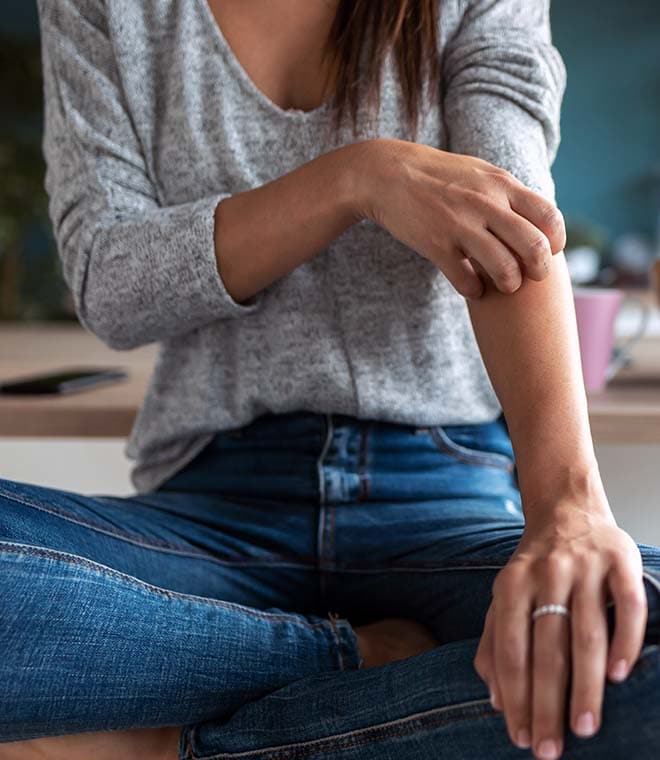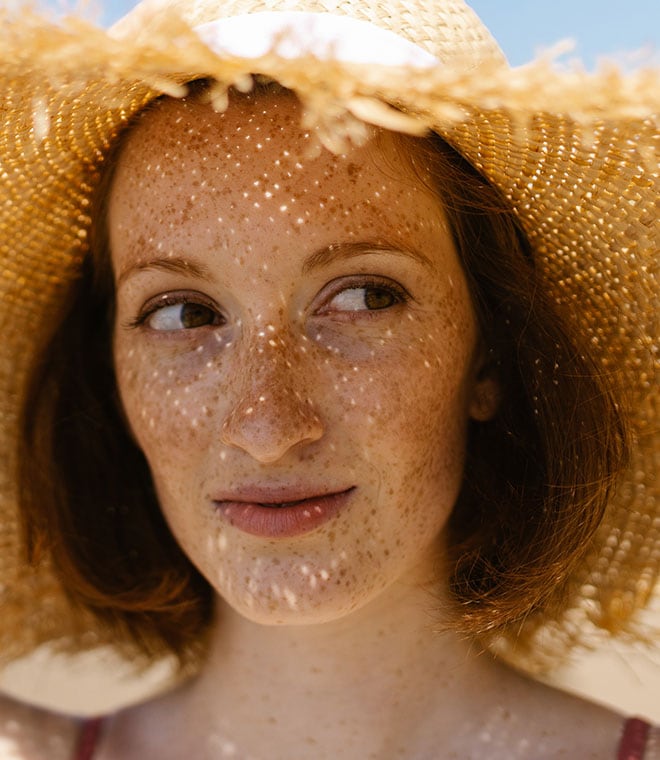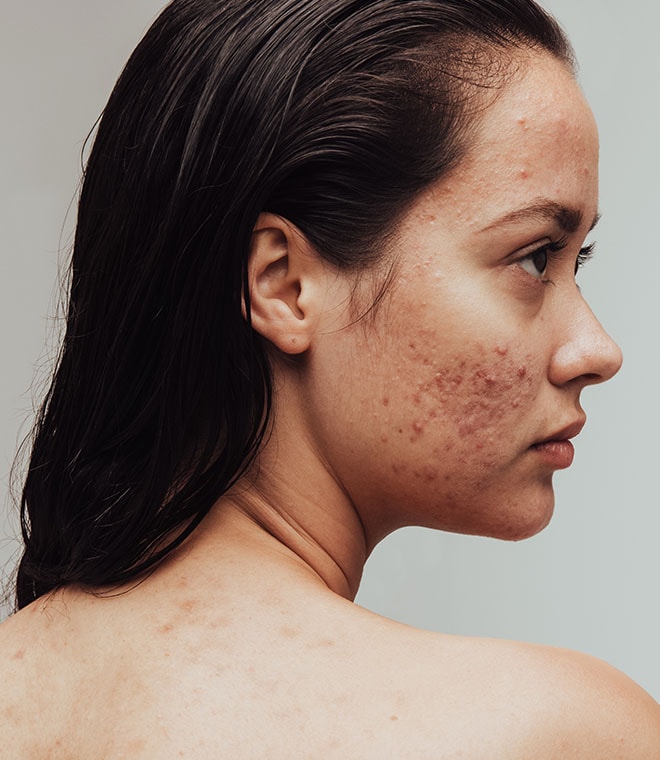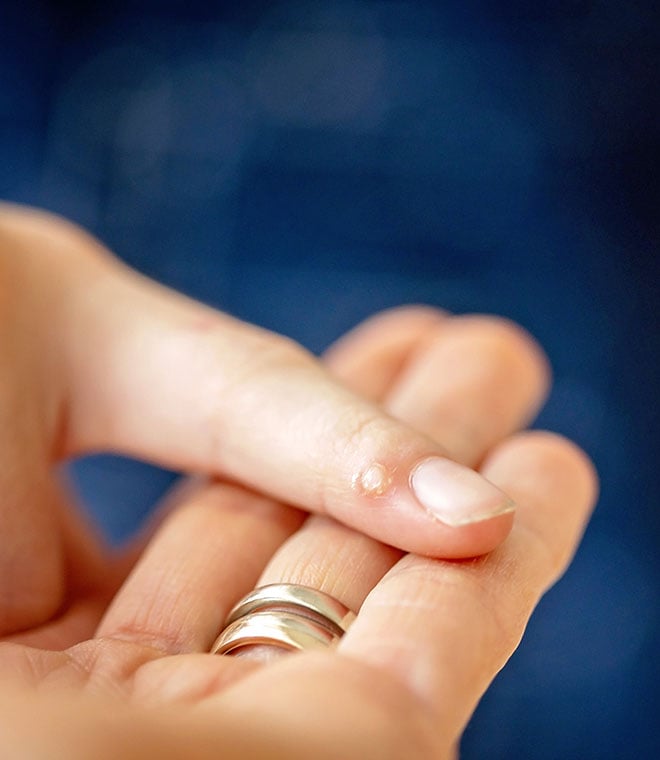Health
Teenage acne: Causes, symptoms and treatment
By Anna H. Chacon, MD, Fellow of the American Academy of Dermatology Apr 08, 2024 • 8 min
Nearly 8 in 10 teenagers have acne, which is considered a normal part of puberty. But the teenage years are tough enough without pimples, and acne — especially severe cases — can be devastating to a young person’s self-esteem. The good news is that teenage acne is treatable, and the sooner you visit your dermatologist for an evaluation, the sooner you can enjoy clearer skin.
Why do teens get acne?
During puberty, hormones known as androgens make the skin’s oil glands bigger. This increases the production of sebum, the skin’s natural oil, which can mix with dead skin cells and clog the pores, causing pimples, including whiteheads or blackheads. Teenagers whose parents had acne as teens are more likely to have it themselves. Teenage acne is not caused by greasy food, dirty skin or stress, although these may worsen existing acne.
Acne treatment for teens
Early treatment for acne can help prevent breakouts and scarring. Acne treatment for teens varies, depending on the type of acne and its severity. For some teens, over-the-counter acne treatments may be effective. These medications come in lotions, gels, cleansers and spot treatments, and include:
Benzoyl peroxide: This medication helps reduce oil and dead skin cells from the pores, and it kills the bacteria that cause acne. It can cause side effects like dry skin, redness and burning, especially in those with sensitive skin.
Salicylic acid: Products containing salicylic acid help prevent the pores from clogging by dissolving dead skin cells. Mild irritation and stinging may result from using salicylic acid products.
Alpha hydroxy acids: Glycolic acid and lactic acid are alpha hydroxy acids that help eliminate dead skin cells, reduce inflammation and stimulate the growth of new skin, improving the appearance of acne.
Hydrocolloid acne patches: These small patches may be used on individual pimples. Hydrocolloid is an ingredient often used to promote skin healing, so it may help pimples heal faster.
Sulfur: Acne products containing sulfur work to get rid of dead skin cells and oil in the pores, and they often contain other ingredients, like salicylic acid, retinoids or benzoyl peroxide.
You may need to experiment with different products to find one that works for you. If over-the-counter acne treatments aren’t working, you may have better luck with prescription medications, which your dermatologist can prescribe based on the type of acne you have and your skin type. Prescription acne treatment for teens may include:
Topical retinoids: These medications are derived from vitamin A. They promote the growth of new skin cells and push dead ones out of the blocked pores. These medications include trentinoin, tazarotene and adapalene. There are over-the-counter products that contain retinoids in lower strengths, including adapalene.
Topical or oral antibiotics: Healthcare providers may prescribe antibiotics for acne. Creams, gels and lotions containing antibiotics help stop the growth of acne-causing bacteria and reduce swelling. Oral antibiotics can help treat moderate to severe acne in teens in cases where the acne doesn’t respond to over-the-counter or prescription topical medications.
If prescription medications don’t improve the acne, other treatments may work. These include:
Light treatment: Laser and light therapies can help reduce the frequency and severity of acne breakouts and reduce the appearance of scars.
Corticosteroid injections: For large, painful acne lesions, injections with corticosteroids can relieve the pain and reduce the size of the lesions.
Birth control pills: For some teenage girls with acne, oral birth control medications can help clear up breakouts and prevent new breakouts.
When using an acne treatment, keep in mind that it may take time for acne to improve, possibly weeks or months. It’s important to have patience. Be sure to carefully follow instructions from your healthcare provider, as well as the directions found on the product packaging.
How to reduce acne
There are a number of things you can do to help prevent acne breakouts, reduce the severity and size of acne lesions, and improve the appearance of your skin. Here’s how to reduce acne with some simple lifestyle changes:
Wash your face daily: To help remove makeup and products that can clog your pores, wash your face once or twice a day with a mild cleanser and warm water. Cleanse skin gently as scrubbing your face can worsen acne by irritating your skin and pores. Avoid sleeping with makeup on. Be sure to thoroughly remove all makeup before going to bed.
Choose noncomedogenic or nonacnegenic skin care products: Makeup, sunscreen and other skin care products labeled noncomedogenic or nonacnegenic are formulated to avoid clogging your pores, and they can help prevent breakouts.
Keep hair products away from your skin: If you use hair gels or sprays, keep them away from your face, since these can clog your pores. If your hair is long, keep it pulled back away from your face, and wash it often to prevent its natural oils from transferring to your face.
Eat healthy food: While greasy and sugary foods don’t cause acne, an unhealthy diet may worsen breakouts in some people. Some studies suggest that healthy foods, like fresh fruits and vegetables, beans and whole grains, can help keep breakouts to a minimum. It can be helpful to identify and avoid foods that tend to trigger breakouts.
Here are a few other things you can do to help prevent acne breakouts:
- Apply acne lotions and gels to your whole face, not just the spots
- Don’t share makeup or makeup applicators
- Remove all of your makeup before bed
- If your skin feels dry after using acne treatments, apply a moisturizer
- Never pop or squeeze acne, which may push oil and dead skin cells deeper into your pores, increase inflammation and cause scarring
- Protect your skin from the sun by using a sunscreen with SPF of 30 or higher.
Teenage acne is very common, but that doesn’t make it easier for a teen to cope with it. Acne, especially when it’s moderate to severe, can cause embarrassment and low self-esteem. If your acne isn’t responding to over-the-counter treatment, see your dermatologist for a treatment plan created just for you. With the right acne treatment for teens, you can enjoy clearer skin and keep breakouts to a minimum.
Clinically reviewed and updated by Julie McDaniel, MSN, RN, CRNI, April 2024.
Sources:
- https://kidshealth.org/en/teens/acne.html
- https://www.aad.org/public/diseases/acne/causes/acne-causes
- https://www.aad.org/public/diseases/acne/derm-treat/hormonal-therapy
- https://www.aad.org/public/diseases/acne/derm-treat/treat
- https://www.aad.org/public/diseases/acne/causes/diet
- https://www.aad.org/public/diseases/acne/skin-care/habits-stop
- https://www.mayoclinic.org/diseases-conditions/acne/in-depth/acne-products/art-20045814
- https://jamanetwork.com/journals/jama/fullarticle/2786498
- https://www.aad.org/media/stats-numbers
- https://www.healthychildren.org/English/health-issues/conditions/skin/Pages/What-Causes-Acne.aspx
- https://my.clevelandclinic.org/health/diseases/12233-acne
- https://health.clevelandclinic.org/guide-to-facial-acids
- https://www.mayoclinic.org/drugs-supplements/sulfur-topical-route/proper-use/drg-20066155?p=1
- https://health.clevelandclinic.org/how-to-bring-a-pimple-to-a-head
- https://www.aad.org/news/how-to-treat-acne



